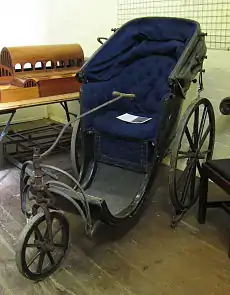Bath chair
A bath chair—or Bath chair—was a rolling chaise or light carriage for one person with a folding hood, which could be open or closed. Used especially by disabled persons, it was mounted on three or four wheels and drawn or pushed by hand.[1] It is so named from its origin in Bath, England,[2] and possibly also after its similarity in appearance to an old-fashioned bathtub.

If required, the chair could also be mounted on four wheels and drawn by a horse, donkey or small pony with the usual turning arrangement. These animal-drawn versions were the forerunners of the invalid carriage. James Heath, of Bath, who flourished before the middle of the 18th century, was the inventor of the bath chair.[1]
Later versions were a type of wheelchair which is pushed by an attendant rather than pulled by an animal. In the 19th century they were often seen at spa resorts such as Buxton and Tunbridge Wells. Some versions incorporated a steering device that could be operated by the person in the chair.
References
-
 One or more of the preceding sentences incorporates text from a publication now in the public domain: Chisholm, Hugh, ed. (1911). "Bath-Chair". Encyclopædia Britannica. 3 (11th ed.). Cambridge University Press. p. 513.
One or more of the preceding sentences incorporates text from a publication now in the public domain: Chisholm, Hugh, ed. (1911). "Bath-Chair". Encyclopædia Britannica. 3 (11th ed.). Cambridge University Press. p. 513. - "Bath chair". City of Bath. Archived from the original on May 19, 2008.
External links
- A 'Bath Chair'. People's Collection Wales.